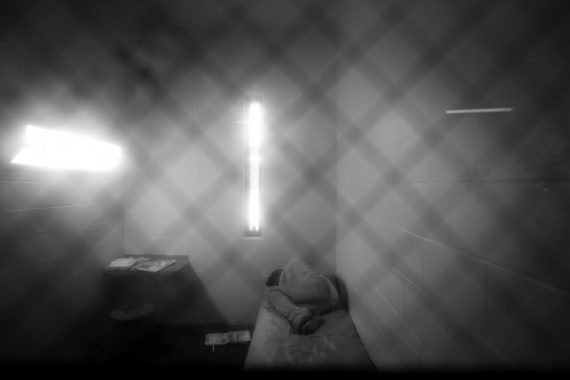
(12-2-16) A 62 year-old Virginia woman arrested for trespassing, who had schizophrenia, diabetes and was incontinent, was released three weeks after she was jailed thanks to cooperation between jail officials, a judge and local mental health officials.
Her release was cited by officials at the Hampton Roads Regional jail as an example of how the jail is taking steps to improve the way it treats inmates with mental illnesses, according to a story by Virginia Pilot Reporter Gary A. Harki. Last year, Jamycheal Mitchell suffered a fatal heart attack in that same jail after literally starving for 101 days while reportedly under constant watch by correctional officers and a nurse. He’d been arrested for stealing $5.05 worth of snack food.
Had jail officials not cooperated with a judge and mental health workers, the 62 year-old woman would have spent four months waiting for trial, Linda Bryant, the jail’s assistant superintendent, was quoted telling Harki.
Okay, now read the first paragraph of this story again,
The jail is citing this as an example of success because it was able to get a 62 year-old incontinent, mentally ill woman charged with misdemeanor trespassing released after spending ONLY THREE WEEKS in jail!
While I applaud the jail administration’s new attitude and spirit of collaboration, this is not a case that anyone should be celebrating and using as an example of exemplary service.
It’s always dangerous second guessing, but here are some questions that I would like answered:
- Why was this woman arrested? Misdemeanor trespassing often is used to get someone who is mentally ill off the streets. She was picked up outside a 7 Eleven. If she was sick why wasn’t she taken directly to a mental health center under a 72 hour hold, rather than jail? Were Crisis Intervention Team trained officers involved in this arrest? Did the officers or mental health officials decide that she did not meet the state’s dangerous criteria and therefore couldn’t be held against her will? Or were there no crisis care beds available so the police decided the jail was her best option? Was she turned away from an emergency room? The Hampton Roads area is where the term “streeting” was coined to describe hospitals turning away severely mentally ill patients because there were no beds available. “Streeting occurs throughout the Commonwealth, but “appears most prevalent in Hampton Roads – where eight of nine Community Services Boards (CSBs) acknowledge streeting last year,” according to the Office of the Inspector General of the Department of Behavioral Health and Developmental Services (DBHDS). Again, why was this woman taken to jail?
- Where was the CSB? In Virginia, mental health services are provided by Community Service Boards, in this case, the Hampton Newport News CSB. When this woman arrived at the jail, when did officers determine she had a mental illness? The fact they realized she had schizophrenia implies that she had some earlier contact with the CSB or mental health officials. Why did it take three weeks for those officials to get her out of jail and into care? In some communities, local mental health workers are part of a jail intake team so they can identify ill persons and get them into treatment facilities. If this woman had been having chest pains, she would have been rushed to a hospital. What sort of communications exists between the jail and CSB?
- Could a mental health docket have helped? If this woman needed to be arrested and charged, could she have benefited from a mental health docket where a judge could have given her an option of accepting mental health services rather than languishing in jail.
“She needs elderly care — somebody to tell her when to get up, when to go to bed, that kind of help,” Jail Administer Bryant told the newspaper.
Does that sound like someone who needs to be jailed for misdemeanor trespassing or someone who local officials simply failed to help?
It would appear that this is yet another example of someone with a mental illness ending up in the criminal justice system because of: poorly trained police officers, a lack of community mental health services or a lack of common sense commitment criteria.
Regardless, Virginians need to ask themselves if this incident is really the best that we can do.



